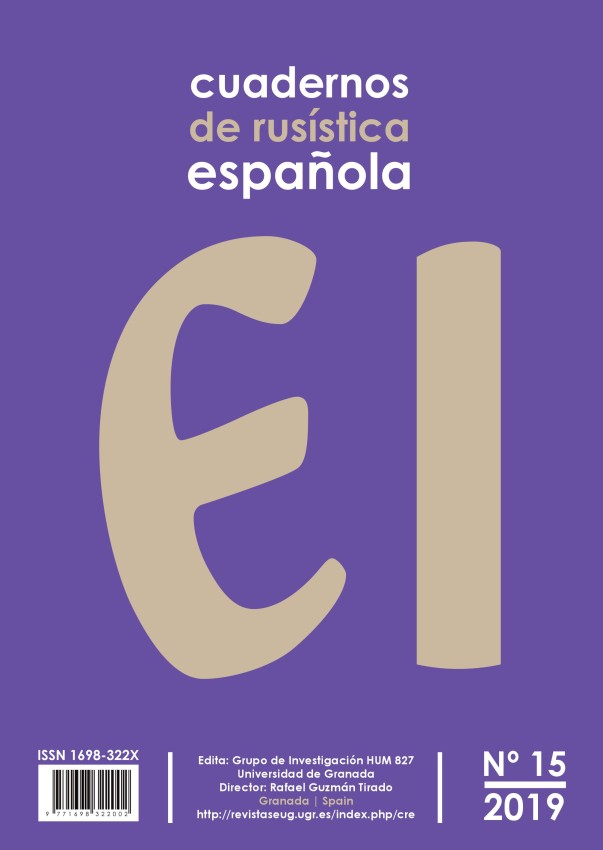To the Origin of the Russian Studies in Spain: Rurik Pavlovitch Kotzebue Records in the Archive of the A. Solzhenitsyn Center for Studies of Russia Abroad
DOI:
https://doi.org/10.30827/cre.v15i0.9590Keywords:
Russian emigration, Russian teaching, Pushkin studiesAbstract
The regularly replenished museum and archival funds of the A. Solzhenitsyn Center for Studies of Russia Abroad provide an opportunity to restore bit by bit the history of the Russian post-revolutionary diaspora. A personal archive of small account acquired from Madrid amazes with the incredible variety of presented materials, from the teenage school geography textbook to the family tree dating back to the legendary El Sid and the first experiments of comparative Russian-Spanish studies. The article traces the ups and downs of the life of a Russian emigrant – a descendant of the branched family of Kotzebue, German and Greek by origin, Orthodox by religion, Russian patriot-nationalist by belief, Swiss doctor of law, leader of the Russian choir, Pushkin translator and researcher, one of the first teachers of Russian in Spain.Downloads
References
BAGNO, V.E. (1983) K teme «Pushkin v Ispanii»: (Novye materialy). Vremennik Pushkinskoj komissii, 1980. Vyp. 18. Nauka, Leningrad.
GÓMEZ CRESPO, F. (1971) Contribución al estudio de temas españoles en la obra de Puškin. Trabajo presentado como Tesis doctoral. Facultad de filosofía y letras. Sección de filología románica, t. 1–3. Universidad de Madrid.
KAZNINA, O.A. (2001) Russkie v Anglii: iz perepiski E.V. Sablina. V sb.: Rossika v SShA, Institut politicheskogo i voennogo analiza, Moskva.
KOTZEBUE, RURIK de (1946) Notion juridique de la compensation. Revue économique et sociale: bulletin de la Société d’Etudes Economiques et Sociales. Vol. 4. № 1.0
KOTZEBUE, R. de. (1962) «El convidado de piedra» en Rusia. STRENAE. Estudos de filologia e historia. Dedicados al Professor Manuel Garsia Blanco. Filosofia y Letras. T. XVI. Salamanca.
KOTZEBUE, R. (1982) Mas huellas eslavas en España (antroponimia e lexico). Actas del Cuarto Congreso Internacional de Hispanistas, Salamanca, 1971. Salamanca, Universidad de Salamanca.
KOTZEBUE, ROSTISLAV von (1984) History and genealogy of the Kotzebue family: completed from General Paul von Kotzebue's memories followed by historical data about note-worthy persons. Composed and completed by his son Rostislav von Kotzebue. Paris, Hervas.
MARCHENKO, T.V. (2016) Barochnye kollizii sud`by: Materialy Ryurika Pavlovicha Kocebu v arxive Doma russkogo zarubezh’ya im. A. Solzhenicyna, Ezhegodnik Doma russkogo zarubezh`ya im. A. Solzhenicyna 2016, Moskva.
NAZEMCEVA, E.N. (2016) Politiko-pravovoe polozhenie russkoj emigracii v Kitae v period Vtoroj mirovoj vojny. Voprosy istorii, № 2.
PANCHAUD, A. (1946) De Kotzebue Rurik. Compensation et Procédure: essai de critique et de juridique pure. LIV et 561 p. (Lausanne 1945. Imprimeries réunies S.A.). Schweizerische Juristen-Zeitung. Heft 2. S. 31.
POUCHKINE, А. (1853) La Fille du capitaine, par Alexandre Pouschkine. Trad. de L. Viardot. Paris, Hachette.
POUCHKINE, А. (1929) La fille du capitaine. Nouvelle traduction intégrale par H. de Witte, avec une préface spécialement écrite pour cette édition, par N. Pouchkine, une introduction de M. Hofmann. Paris, Payot.
POUCHKINE, А.S. (1932) La fille du capitaine. Traduit du russe par E. Semenoff. Paris, Larousse.
POUCHKINE, А. (1937) La fille du capitaine. Trad. par M. Alexandre. Paris, Gründ.
POUCHKINE, А. (1944) La fille du capitane. Trad. du russe par Rurik de Kotzebue. Lausanne, Mermod.
POUCHKINE, А. (1950) La fille du capitaine. Trad. de R. de Kotzebue; illustrations de P. Rousseau. Paris: Éditions G.P.
POUCHKINE, A. (1947–1948) La fille du capitaine [Texte imprimé] / Trad. et préfacé par R. Labry. 2 vol. (Collection bilingue des classiques étrangers). Vol. I: Texte. Vol. II: Commentaires.Paris: Ed. Montaigne.
PUSHKIN, A.S. (1952) Kapitanskaya dochka. Gosudarstvennoe izdatel’stvo xudozhestvennoj literatury, Moskva.
PUSKIN, A. (1938) Teatro (Festín durante la peste. El Convidado de piedra). Trad. de O. Savich y Manuel Altolaguirre. Barcelona, A.E.R.C.U.
RESHETOV, S.G. (2009) Rod Iptis i ego potomki. K 180-letiyu so dnya rozhdeniya M.P. Ralli, urozhd. Iptis. https://docplayer.ru/58172988-Rod-ipitis-i-ego-potomki.html (data obrashcheniya 25.05.2019).
ROSSIYA I ISPANIYA (2013) Rossiya i Ispaniya: dialog kul’tur / Rusia y España: diálogo intercultural. Manual práctico de lectura y perfeccionamiento de la lengua rusa para hispanohablantes. Granadab Jizo Ediciones.
SANCHEZ-PUIG, М. (1988) España en la obra de Pushkin. Historia у vida. Vol. 21. № 248.
SANCHES PUIG, M. (2010) Ispanskaya rusistika: ot i do. Vostochny`j svet, № 2.
YACZUK, N.A. (2014) «Smert’ nemcza Kocebu» i drugie proisshestviya: politika i literatura. Izvestiya Ros. gos. ped. un-ta im. A.I. Gercena. № 169.
VIDAL, E. (1970) Pushkin y España. Tesis de licenciatura. Universidad de Barcelona. Sección de filología románica (Hispánicas).












